The 2024-25 Program of Studies features new grading purpose statements and new course offerings in six departments.
Grading purpose statements explain how each department defines success and achievement in its courses.
For example, the history department’s grading purpose statement reads, “Grades reflect and communicate our ongoing formative and summative assessment of students’ analytical abilities, including historical methods and habits of mind,” while the science department’s says, “Grading encourages students to engage actively in the learning process and meet their responsibilities as learners.”
Several educators in the community had been reading the work of Dr. Thomas Guskey, a renowned Chicago-based professor and former public school educator who studies learning and teaching structures. When Dr. Guskey visited Lab last fall and met with faculty members, he explained the importance of defining respective grading philosophies for students. The statements, crafted by each department individually, came from these discussions.
After carefully working to figure out how to best explain grading at U-High, assistant principal Zilkia Rivera-Vazquez said the statements were a result of hard work behind the scenes.
“We want grading to be seen as feedback telling you where you can grow and where you are glowing already,” Ms. Rivera-Vazquez said, “and we wanted to give each department a chance to tell students what they see beyond just the letter grade. These are less grading policies and more philosophy statements.”
Ms. Rivera-Vazquez said that helping students and their families understand grading was key.
“The ambition was to help students understand there are additional reasons why grades exist,” Ms. Rivera-Vazquez said. “It was about sharing with the whole high school community what faculty members believe is the purpose of grades.”
Sophomore Luka Vegna-Spofford said he believes the statements may not change how most students perceive their grades, but, as a rising junior, he said he will find them beneficial in understanding his academic performance.
“It can sometimes be ambiguous what a grade represents, so this explains things better for me,” Luka said. “There are ideas at Lab about how each class is supposed to be graded, but this puts into writing what is expected of students.”
The curriculum features recently added course selections for the 2024-25 school year:
English: English Seminar (fall/spring semesters), a class for students interested in more advanced explorations of literature in addition to current English 3 and 4 courses, and changing themes for existing English 3 and English 4 courses
Fine arts: SewCalled Studio (spring semester), a continuation of Sew CalledCreations, an introductory class teaching principles of sewing and fashion design
History: Advanced Topics Native American Histories (yearlong)
Math: Computational Introduction to Combinatorics and Number Theory (yearlong)
Science: Science of Sound (yearlong) and reactivation of numerous semester-long elective courses
World Languages: Chinese for Heritage Speakers I (yearlong)






















































